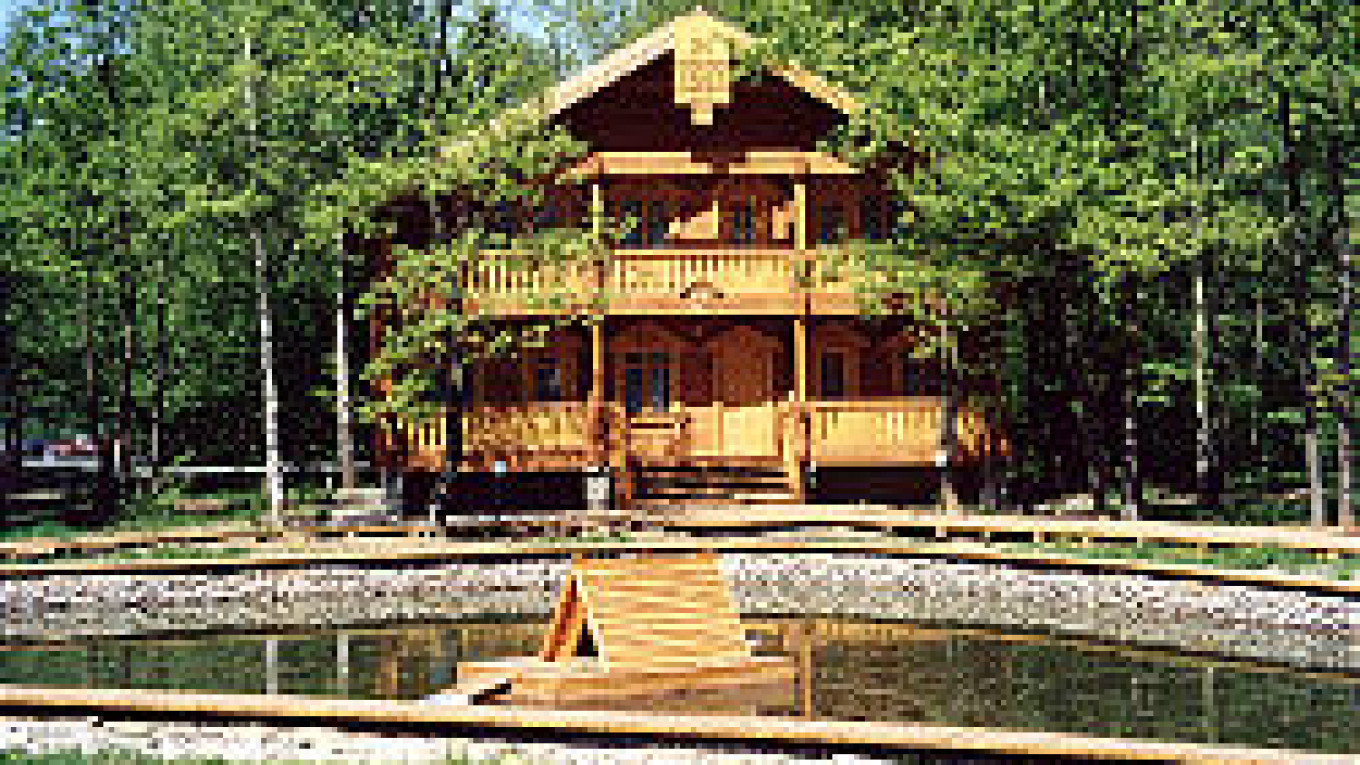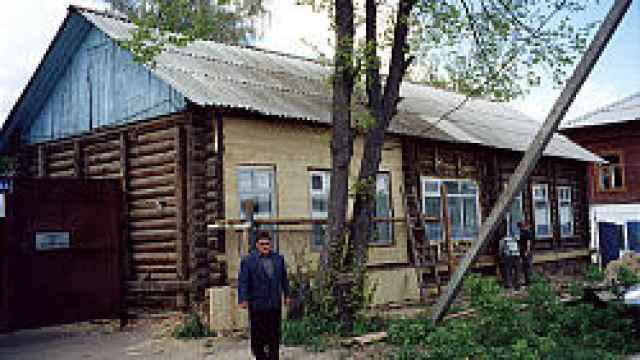One day last year the owner of an electronics store realized his five-year-old business near the bank of the Kostroma wouldn't support him and his family much longer. It didn't take long for the solution to his economic woes to come to him, and it seemed like a breeze.
From the windows of his one-story office building, he could see the tour buses and private cars of tourists wobble by on the narrow strip of road between his office and the river leading to the 16th-century Monastery of St. Ipathy. The place where the Romanov dynasty began, and Kostroma's main tourist attraction, St. Ipathy is located 2 1/2 kilometers from the town center as well as the nearest hotel. So last October, Novosyolov closed up shop, got out his savings and began converting his office into a modern, fully furnished seven-room bed and breakfast.
"UNESCO recently said Kostroma has strong potential for tourism and the local government has said it is going to do more to develop it," said Novosyolov, 38, who began taking in guests three months ago. "And not everyone is going to want to stay in those big hotels even if there is room. Some want a small, comfortable place where no one will bother them, where they can feel at home."
Novosyolov is just one of many residents of historic towns along the Golden Ring who have seized the opportunity provided by a mini-boom in tourism and a deficit of summer accommodation to try their hand at the hospitality industry. On offer are modern conveniences, individual attention and services ranging from town tours to dining, as well as Russian country atmosphere to foreign and Russian middle-class tourists seeking something different to big, concrete, Soviet-era hotels.
For entrepreneurs like Novosyolov, the timing couldn't be better, tour agency officials and hotel representatives say.
"In the summertime, practically all the hotels along the ring are booked and sometimes we have to turn down requests from foreign partners in Germany, Italy and France because there is nowhere to put guests," said Alexei Zhegalov, general director of Vit-Inform, a travel agency specializing in Golden Ring tours. He said the ring currently suffers a shortfall of about 20,000 beds during peak summertime.
Russia's No. 3 tourist destination after Moscow and St. Petersburg, the Golden Ring is a chain of some 20 towns around Moscow that date back as far as the 11th century. The most popular destinations are Suzdal, Kostroma, Yaroslavl, Rostov Veliki, Vladimir and Sergiyev Posad.
During the 1970s, the Soviet government promoted internal tourism along the ring, building several hotels, including 12-story concrete structures such as the Volga in Kostroma and the Golden Ring in Vladimir. Little attention was placed on comfort, with rooms built as small as 9 square meters. But with the fall of the Soviet Union, internal tourism dropped substantially and some hotels around the ring closed.
To attract foreign and middle-class Russian tourists, older hotels have had to undertake major renovations. At most of the larger ones, workers are knocking down walls to turn the notoriously claustrophobic rooms with Soviet-style furniture into 20-square-meter semi-deluxe and deluxe rooms with European comforts and new furniture. But that has chipped away at the number of available rooms. So has the renting out of entire floors to businesses. The Volga has reduced the number of rooms through enlargement from 540 to 250, said Tamara Ignatova, the hotel's general director.
But although tourism is picking up, new large-scale hotels to accommodate them are not expected. The huge initial investments required, rising maintenance costs and tourism's seasonal dips make such hotels financially risky. That has given individuals like Novosyolov a chance to step in. And many expect the trend of small-scale private hotels along the Golden Ring to continue.
"We pay about $1 million per month just on maintenance and that is increasing as utility tariffs rise," said Ignatova, who has had to pass on the cost to clients by raising prices 20 percent over the last year. "We spent about $1.5 million last year on renovations and need to do more, but we don't have the money to do so yet. We still have a way to go."
Novosyolov, who completely renovated his office and opened for business within four months, said he hopes to recoup his $30,000 investment within two years.
Valentina Kukushkina, who opened a modern, furnished four-room B&B in the center of Kostroma two years ago, said she would recoup her investment sometime next year. "I thought it would take about two years, but I didn't expect that I would add cable TV with 180 channels and redo the plumbing," she said.
Kukushkina charges from $40 to $60 per room, depending on size, while Novosyolov charges $20 to $40. The centrally located Volga charges foreigners from $30 for a renovated single-room with Soviet furniture to $70 for a semi-lux.
Kukushkina, whose husband runs a local tour agency, said the Kostroma B&B industry is a good business to be in, and she wants to expand before it's too late. She is looking to add six more rooms at her location and hopes to take over a 15-room, dilapidated municipal hotel in a tsarist-era building and turn it into a seven- or eight-room hotel.
Sergei Kuchkov, owner of Dom Kuchkova, a 17-room B&B consisting of two neighboring buildings in Suzdal, said an eight- or nine-room B&B along the ring is ideal.
"It is large enough to accommodate a bus group, but small enough to turn off water and electricity and lock up when the season is slow," he said.
But, Zheralov said, any new hotel needs to get proper licensing for such things as fire safety before tour companies can work with them.
|
| Todd Prince / For MT Vyacheslav Novosyolov began converting his electronics store in Kostroma into a seven-room bed and breakfast last October. |
Suzdal is the hottest spot on the Golden Ring. New hotels and rental homes are going up quickly. A 52-year-old former Intourist employee recently completed a four-room wooden B&B a stone's throw from St. Basil's Monastery last fall for about $50,000. Two new rental homes have been recently completed and work on a four-room hotel has just began -- all within 100 meters of Dom Kuchkova.
But the new, small hotels and B&Bs are not just trying to soak up excess summer visitors. They are aiming to attract middle-class guests prepared to pay for additional features such as banyas, saunas, restaurants, cafes, outdoor grills and winter sport rentals. Owners hope to lure Russian tourists who frequent the Golden Ring during the slower winter months away from the bigger hotels -- mainly with competitive prices and more flexibility.
While a pair of Americans eat in Dom Kuchkova's basement restaurant, a group of eight Russians from Vladimir gather in the enclosed grill area on the B&B's property, one strumming a guitar, several making shashliki and everyone singing along.
"We have come here before because we can relax, cook and drink," said Natasha, a gynecologist with the group. "This is like being at a dacha."
Vechni Strannik, a medieval-style, eight-room hotel on the edge of Ivanovo that opened six months ago, has three bars, a Finnish and Turkish sauna, restaurant, pool tables and striptease facilities all compactly built inside. There is an outdoor pool that is nearly finished, a grill area and enclosed parking for guests. A single-room with European furnishings costs 950 rubles ($30). A refurbished single room at the centrally located Tourist, where loose floor tiles indicate it hasn't had a single major capital renovation in its 20-plus year existence, costs 1,030 rubles.
As big hotels struggle to usher in Western-style furniture and comforts, some B&Bs and small hotels are going for a traditional Russian look that fits with the surroundings.
"Euro-style, Euro-style, Euro-style, people are sick of it -- it's all synthetic," said Victoria Koval, a former worker at the Golden Ring in Vladimir and now an administrator at the two-month old Russkaya Derevnya, a small hotel complex on the city outskirts consisting of three eight-room, wooden buildings in Russian cottage style, a restaurant and soon-to-be-completed casino and striptease.
The Kostroma city administration seems to be on the same wavelength as Koval. According to Novosyolov, the city intends to move an old, Russian cottage into the monastery area this summer to house tourists. He said he has already spoken with the administration about renting out the house as a hotel.
Though the three rooms on the first floor of his new B&B are in modern Western-style, Novosyolov said he intends to add a second wooden floor in the style of a Russian cottage. He is currently adding a wooden facade to his 1938 concrete building.
"Foreign tourists seem to like the wooden style and for me, that is cheaper," he said.
Novosyolov is eyeing the just completed five-room wooden house behind his B&B, something he estimates would cost him $50,000.
Zhegalov says there is a growing interest among tourists in both hotels and B&Bs in traditional Russian-style with modern comforts and expects the concept will soon spread to other towns such as Rostov Veliki and Plyos, scenic places that currently offer little in the way of accommodation.
"Foreign tourists are always inquiring about accommodation connected with Russian history or culture. They want a unique product. But it won't work if, for instance, if there is only one toilet and shower per floor."
Russians, he says, are into the traditional style as well.
"A few years ago, Russian tourists would complain if things were in traditional Russian style. Some didn't like the open salt bowls or the long wooden tables in restaurants. They wanted the four-seat square table and things to be like they experienced on their trips to Europe.
But now they seem to be more interested in places in traditional Russian style."
A Message from The Moscow Times:
Dear readers,
We are facing unprecedented challenges. Russia's Prosecutor General's Office has designated The Moscow Times as an "undesirable" organization, criminalizing our work and putting our staff at risk of prosecution. This follows our earlier unjust labeling as a "foreign agent."
These actions are direct attempts to silence independent journalism in Russia. The authorities claim our work "discredits the decisions of the Russian leadership." We see things differently: we strive to provide accurate, unbiased reporting on Russia.
We, the journalists of The Moscow Times, refuse to be silenced. But to continue our work, we need your help.
Your support, no matter how small, makes a world of difference. If you can, please support us monthly starting from just $2. It's quick to set up, and every contribution makes a significant impact.
By supporting The Moscow Times, you're defending open, independent journalism in the face of repression. Thank you for standing with us.
Remind me later.



